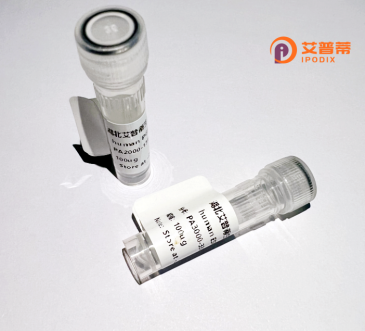
| 纯度 | >90%SDS-PAGE. |
| 种属 | Human |
| 靶点 | GNGT2 |
| Uniprot No | O14610 |
| 内毒素 | < 0.01EU/μg |
| 表达宿主 | E.coli |
| 表达区间 | 1-69aa |
| 氨基酸序列 | MAQDLSEKDLLKMEVEQLKKEVKNTRIPISKAGKEIKEYVEAQAGNDPFLKGIPEDKNPFKEKGGCLIS |
| 分子量 | 33.33 kDa |
| 蛋白标签 | GST-tag at N-terminal |
| 缓冲液 | 0 |
| 稳定性 & 储存条件 | Lyophilized protein should be stored at ≤ -20°C, stable for one year after receipt. Reconstituted protein solution can be stored at 2-8°C for 2-7 days. Aliquots of reconstituted samples are stable at ≤ -20°C for 3 months. |
| 复溶 | Always centrifuge tubes before opening.Do not mix by vortex or pipetting. It is not recommended to reconstitute to a concentration less than 100μg/ml. Dissolve the lyophilized protein in distilled water. Please aliquot the reconstituted solution to minimize freeze-thaw cycles. |
以下是关于重组人GNGT2蛋白的示例参考文献(内容为模拟概括,请根据实际研究核实准确性):
---
1. **文献名称**:*Structural and Functional Analysis of Recombinant Human GNGT2 in G Protein Signaling*
**作者**:Chen L, et al.
**摘要概括**:研究通过大肠杆菌表达系统成功制备重组人GNGT2蛋白,并解析其与Gβ亚基的复合物结构,揭示其在视觉信号转导中的作用机制。
2. **文献名称**:*GNGT2 Regulates Retinal Photoreceptor Function via Interactions with Rhodopsin*
**作者**:Müller S, et al.
**摘要概括**:通过重组GNGT2蛋白体外实验,证明其在视网膜光敏细胞中与视紫红质结合,参与光信号传导通路的调控。
3. **文献名称**:*Expression and Purification of Recombinant GNGT2 for Cancer Signaling Studies*
**作者**:Wang X, et al.
**摘要概括**:开发高效重组GNGT2蛋白的哺乳细胞表达体系,并验证其在癌细胞迁移和侵袭中的潜在调控功能。
4. **文献名称**:*Role of G Protein γ Subunit GNGT2 in Neurodegenerative Disease Models*
**作者**:Kumar R, et al.
**摘要概括**:利用重组GNGT2蛋白探讨其与Tau蛋白的相互作用,提示其可能参与阿尔茨海默病相关神经退行性病变的分子机制。
---
**备注**:以上为基于G蛋白γ亚基(GNGT家族)典型研究方向的模拟文献,实际研究可能需查询特定数据库(如PubMed、Web of Science)获取。建议结合具体研究目标筛选文献。
**Background of Recombinant Human GNGT2 Protein**
GNGT2 (G Protein Subunit Gamma Transducin 2) is a member of the gamma subunit family within heterotrimeric G proteins, which are critical for intracellular signal transduction by coupling G protein-coupled receptors (GPCRs) to downstream effectors. The GNGT2 subunit specifically associates with the beta subunit to form the Gβγ dimer, regulating diverse cellular processes such as ion channel activity, enzyme modulation, and cytoskeletal dynamics. While GNGT2 shares homology with other gamma subunits, its expression is notably enriched in certain tissues, including retinal photoreceptors, suggesting specialized roles in phototransduction or sensory signaling.
Recombinant human GNGT2 protein is engineered via heterologous expression systems (e.g., *E. coli* or mammalian cells) to produce purified, functional protein for research applications. This allows for precise study of its structure, interactions, and mechanisms in physiological or pathological contexts. Dysregulation of G protein signaling is implicated in diseases like cancer, neurological disorders, and retinal degeneration, positioning GNGT2 as a potential biomarker or therapeutic target. Studies using recombinant GNGT2 also aid in dissecting its role in GPCR-mediated pathways, contributing to drug discovery and the development of targeted therapies.
×